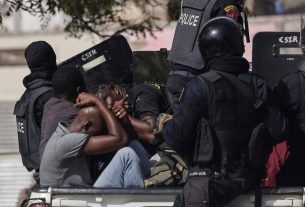The death of 25-year-old Sathsara Nimesh while in police custody has reignited long-standing concerns over alleged police brutality and custodial abuse in Sri Lanka, triggering protests, a legal outcry, and an official investigation.
A Controversial Arrest and Unanswered Questions
Nimesh, a trainee caregiver from Badulla, was detained by police on April 1 in Colombo after being accused of breaking into a private residence. He was taken first to the Welikada police station, then transferred to a psychiatric facility, where he was pronounced dead the next morning.
Police claimed Nimesh had attempted suicide and had a history of mental health issues. However, his mother, Samanthi, disputes this narrative, stating publicly (as reported by DW News) that her son had no known mental health conditions and that his body showed extensive signs of physical abuse.
“He had so many bruises and swelling on one leg. Who beat him?” she asked, alleging that both police and the homeowners may have assaulted her son.
She further claimed that his clothing had been changed, and that his personal belongings—including his pants—were found discarded in a bin at the police station.
Investigation Underway, Officers Suspended
Following a public outcry and the family’s demand for clarity, authorities have granted permission for a second postmortem, scheduled for April 23, to determine the cause of death.
Police spokesperson Frederick Udyakumara Wootler confirmed to DW that two officers have been suspended, and the officer in charge during Nimesh’s detention—allegedly also linked to the 2023 custodial death of a domestic worker—has been transferred again.
“We are not going to whitewash any of the police officers if they have been involved,” Wootler told DW, adding that “stern and stringent action” would follow the outcome of the investigation.
A Pattern of Abuse?
Human rights advocates argue that Nimesh’s case is not isolated. According to the Human Rights Commission of Sri Lanka, 24 custodial deaths and 13 police encounter deaths were recorded between January 2020 and August 2023.
Senaka Perera, the family’s lawyer, told DW that he is currently handling four cases of custodial deaths in 2025 alone. He criticised the culture of impunity, stating:
“The same thing keeps happening… We have no professional police.”
Perera also pointed to recurring reappointments of officers linked to prior abuse cases, underscoring a lack of accountability within the system.
Decades of Systemic Concerns
Sri Lanka has faced international scrutiny over police conduct for years. A 2015 report by Human Rights Watch detailed widespread torture and abuse in custody. More recently, in 2023, video evidence emerged of a Tamil man, Nagarasa Alex, alleging severe abuse by police—he later died from his injuries.
Rajeev Amasuriya, President of the Bar Association of Sri Lanka, told DW that custodial violence has plagued the nation for decades. He emphasized the urgent need for systemic reforms and human rights training for law enforcement.
“We need to find ways and means that these custodial deaths must come to an end,” Amasuriya said.
A Turning Point?
The candlelight vigil and protest following Nimesh’s death have given fresh momentum to civil society demands for reform. As the second postmortem approaches, the focus now shifts to whether Sri Lanka’s justice system will hold those responsible to account—or whether this case will join a long list of unresolved deaths in custody.
Sources:
- Deutsche Welle (DW): www.dw.com
- Human Rights Commission of Sri Lanka
- Human Rights Watch, 2015 report: “We Live in Constant Fear”
- Connect CRE, Paul Bubny (attribution of original article sources)
Let me know if you’d like a version adapted for legal, international rights , or public information purposes.



